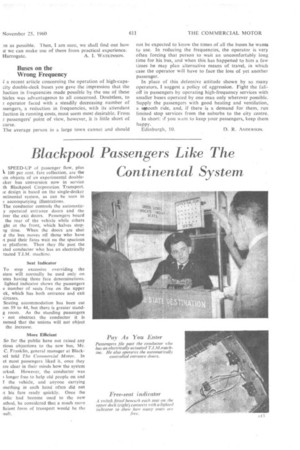Blackpool Passengers Like The Continental System
Page 47

If you've noticed an error in this article please click here to report it so we can fix it.
SPEED-UP of passenger flow, plus
L WO per cent, fare collection, are the in objects of an experimental doublecker bus conversion now in service th Blackpool Corporation Transport. te design is based on the single-decker nitinental system, as can be seen in .t accompanying illustrations.
The conductor controls the automaticy operated entrance doors and the iver the exit doors. Passengers board the rear of the vehicle while others ght at the front, which halves stop: ng time. When the doors are shut d the bus moves off those who have
paid their fares wait on the spacious ar platform. Then they file past the ated conductor who has an electrically tuated T.J.M. machine.
Seat indicator To stop excessive overriding the stem will normally be used only on utes having three fare denominations. lighted indicator shows the passengers e number of seats free on the upper • ck, which has both entrance and exit &cases.
Seating accommodation has been cut om 59 to 44, but there is greater standg room. As the standing passengers not obstruct the conductor it is sumed that the unions will not object the increase.
More Efficient
So far the public have not raised any rious objections to the new bus, Mr. C. Franklin, general manager at Black)ol told The Commercial Motor, In ct most passengers liked it, once they tre clear in their minds how the system orked. However, the conductor was ) longer free to help old people on and the vehicle, and anyone carrying mething in each hand often did not
• his fare ready quickly. Once the
iblic had become used to the new ethod, he considered that a much more ficient form of transport would be the .sult.




















































































































